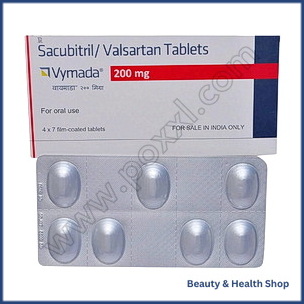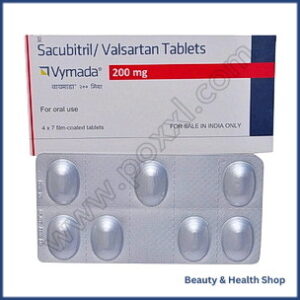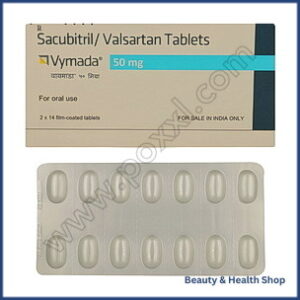ADDICTION
ALCOHOL DEPENDENCE
QUIT SMOKING
ALLERGY
ANTI FUNGAL
FUNGAL INFECTION
FUNGAL NAIL INFECTIONS
ANTI-REJECTION DRUGS
ANTI WORM
ANTIBIOTIC
BACTERIAL INFECTIONS
ARTHRITIS
GOUT
OSTEOARTHRITIS
RHEUMATOID ARTHRITIS
BLOOD
LOW PLATELET COUNT
THROMBOPHLEBITIS
VARICOSE VEINS
COLON
ANAL FISSURE
PILES
ULCERATIVE COLITIS
DIABETES CARE
DIABETES INSIPIDUS
DIABETES TYPE
DIABETIC FOOT ULCERS
GLUCOSE MONITOR
EYES/EAR CARE
DRY EYES
EYE CARE
EYE EXAMINATION
EYE INFECTION
EYE LASHES
EYE PAIN
GLAUCOMA
OCULAR HYPERTENSION
UVEITIS
FEVER CARE
MALARIA
RHEUMATIC FEVER
TYPHOID FEVER
GASTROINTESTINAL
ACIDITY
CONSTIPATION
CROHN'S DISEASE
DIARRHOEA
GALLBLADDER STONES
INTESTINAL ULCERS
IRRITABLE BOWEL SYNDROME
MOTION SICKNESS
NAUSEA
Vymada (Sacubitril/Valsartan)
Vymada 50 mg (Sacubitril/Valsartan)
Vymada 100 mg (Sacubitril/Valsartan)
Vymada 200 mg (Sacubitril/Valsartan)
| Active Ingredient (Generic Name): | Sacubitril/Valsartan |
|---|---|
| Indication: | Heart failure |
| Manufacturer | Novartis India Ltd |
| Packaging: | 28 tablets in 1 box, 14 tablets in one strip |
From: $235.00
Vymada, a medication combining Sacubitril and Valsartan, is typically prescribed to treat heart failure with reduced ejection fraction, aiding in improving heart function and enhancing quality of life. It works through the dual action of Sacubitril inhibiting the neprilysin enzyme and Valsartan acting as an angiotensin receptor blocker. The medication is usually taken orally as directed by your healthcare provider, with or without food. While primarily used for heart failure, some off-label uses may include managing hypertension or chronic kidney disease. Before taking Vymada, thoroughly review your medical history and inform your healthcare provider of any relevant conditions or medications. Additionally, following a balanced diet low in salt, monitoring fluid intake, and moderating alcohol consumption are recommended. Be aware of potential side effects like dizziness or hyperkalemia, and seek prompt medical attention in case of a missed dose or overdose. For more information on Vymada usage and precautions, consult your healthcare provider or pharmacist.
To understand the benefits of Vymada (Sacubitril/Valsartan), consider its unique dual mechanism of action. Vymada works by combining two medications, sacubitril, and valsartan, to provide a synergistic effect in treating heart failure. Sacubitril inhibits neprilysin, an enzyme that breaks down beneficial hormones involved in regulating blood volume and blood vessel relaxation. By inhibiting neprilysin, sacubitril helps increase the levels of these beneficial hormones, leading to improved heart function and reduced strain on the heart.
Valsartan, on the other hand, is an angiotensin receptor blocker (ARB) that helps relax blood vessels, lower blood pressure, and decrease the workload on the heart. By blocking the effects of angiotensin II, valsartan helps reduce the constriction of blood vessels and the retention of water, ultimately improving blood flow and reducing the symptoms of heart failure.
Together, sacubitril and valsartan in Vymada work synergistically to improve heart function, reduce symptoms of heart failure, and enhance overall quality of life for patients.
Why is this medication prescribed?
Considering the unique dual mechanism of action of Vymada (Sacubitril/Valsartan), its prescription aims to effectively treat heart failure by combining the benefits of sacubitril and valsartan. Sacubitril works to inhibit the enzyme neprilysin, which is responsible for breaking down beneficial hormones that help regulate blood pressure and fluid balance. By blocking this enzyme, sacubitril allows these hormones to remain active, leading to improved heart function and reduced strain on the heart. Valsartan, on the other hand, is an angiotensin II receptor blocker that relaxes blood vessels, lowering blood pressure and decreasing the workload on the heart. When combined, sacubitril and valsartan work synergistically to enhance the management of heart failure symptoms and reduce the risk of cardiovascular events. This dual therapy is specifically prescribed for patients with heart failure with reduced ejection fraction to improve cardiac function and quality of life.
How should this medicine be used?
For best outcomes, take Vymada (Sacubitril/Valsartan) as directed by your healthcare provider. This medication is typically taken by mouth with or without food. It is important to follow the dosage instructions provided by your doctor or pharmacist. Do not increase or decrease the dose without consulting your healthcare provider. If you miss a dose, take it as soon as you remember, unless it is close to the time of your next dose. In that case, skip the missed dose and continue with your regular dosing schedule. Do not take a double dose to make up for a missed one.
It is essential to continue taking Vymada regularly to experience the full benefits of the medication. Do not stop taking it without consulting your healthcare provider, even if you start feeling better. Your doctor may need to adjust your dosage gradually. If you have any questions or concerns about how to use Vymada, do not hesitate to reach out to your healthcare provider for guidance.
Other uses for this medicine
If your healthcare provider determines it necessary, Vymada (Sacubitril/Valsartan) may be prescribed for uses beyond its primary indication. This medication is primarily used for treating heart failure with reduced ejection fraction, but in some cases, it might also be prescribed off-label for other conditions. One potential off-label use of Vymada is in the management of hypertension. The combination of sacubitril and valsartan can help lower blood pressure effectively in certain individuals who may not respond well to other antihypertensive medications. Additionally, some healthcare providers may recommend Vymada for patients with certain types of chronic kidney disease to help protect the kidneys and manage blood pressure simultaneously. Notably, using Vymada for off-label purposes should only be done under the guidance and supervision of a qualified healthcare professional. They will assess your individual health needs and determine if Vymada is a suitable option for your specific condition.
What special precautions should I follow?
When taking Vymada (Sacubitril/Valsartan), it is essential to review your medical history thoroughly. This medication may interact with certain conditions or medications you have used in the past. Make sure to inform your healthcare provider about any pertinent details to guarantee safe and effective treatment with Vymada.
Check Medical History Thoroughly
Prior to starting Vymada (Sacubitril/Valsartan), make sure to carefully examine your medical history for any existing conditions or medications that may interact with this treatment.
- Inform your healthcare provider about any history of kidney or liver problems.
- Disclose if you have a history of angioedema (swelling under the skin).
- Mention if you are pregnant or planning to become pregnant.
- Let your doctor know if you are currently taking any other medications, especially ACE inhibitors or aliskiren.
- Stay vigilant for signs of low blood pressure, such as dizziness or fainting, and report them promptly to your healthcare provider.
What special dietary instructions should I follow?
To maintain peak health while taking Vymada (Sacubitril/Valsartan), it is essential to adhere to specific dietary instructions. It is recommended to follow a balanced diet low in salt to complement the effects of this medication. High-sodium foods can counteract the benefits of Vymada, so limiting your salt intake is vital. Be mindful of processed foods, canned soups, and salty snacks as they tend to be high in sodium. Opt for fresh fruits and vegetables, lean proteins, and whole grains instead.
Additionally, it is important to monitor your fluid intake while on Vymada. Make sure you are drinking enough water but avoid excessive amounts that can strain your heart. Alcohol consumption should be moderated as well, as it can interact with Vymada and worsen its side effects. Consult with your healthcare provider or a registered dietitian to create a personalized dietary plan that aligns with your medication regimen and overall health goals. By following these dietary guidelines, you can support the effectiveness of Vymada in managing your condition.
What should I do if I forget a dose?
If you forget to take a dose of Vymada (Sacubitril/Valsartan), promptly take it as soon as you remember, unless it is close to the time for your next scheduled dose. In the latter case, it is best to skip the missed dose and continue with your regular dosing schedule. Do not double the dose to catch up. Missing a dose occasionally may not have a significant impact, but try to take Vymada consistently as prescribed to maximize its effectiveness in managing your condition. Setting reminders or integrating it into your daily routine can help you remember to take your medication on time. If you frequently forget doses, consider using pill organizers or setting alarms to improve adherence. Consulting your healthcare provider for guidance on managing missed doses or establishing a more effective medication routine can be beneficial in ensuring the best benefits of Vymada therapy.
What side effects can this medication cause?
Vymada (Sacubitril/Valsartan) can cause some serious side effects that you should be aware of. It’s important to monitor for any persistent adverse reactions while taking this medication. If you notice symptoms like severe dizziness, difficulty breathing, or swelling, contact your doctor immediately.
Monitor Persistent Adverse Reactions
Monitor for potential adverse reactions such as dizziness, cough, or hyperkalemia when taking Vymada (Sacubitril/Valsartan). It’s crucial to be aware of any persistent side effects that may arise during your treatment. Some common adverse reactions to watch out for include:
- Dizziness
- Persistent cough
- Hyperkalemia (high levels of potassium in the blood)
- Fatigue
- Kidney problems
Some side effects can be serious. If you experience any of the following symptoms, call your doctor immediately:
Serious side effects of this medication may include severe allergic reactions, chest pain, or difficulty breathing. If you experience any of the following symptoms, contact your doctor immediately:
- Swelling of the face, throat, or tongue
- Rapid weight gain or swelling in the legs
- Extreme dizziness or lightheadedness
- Symptoms of high potassium levels such as muscle weakness or irregular heartbeat
- Signs of kidney problems like change in the amount of urine output
These symptoms could indicate potentially severe reactions to Vymada (Sacubitril/Valsartan). It is essential to seek prompt medical attention if you encounter any of these side effects to ensure appropriate management and care.
What should I know about the storage and disposal of this medication?
When storing Vymada (Sacubitril/Valsartan), make sure that you store it in its original container at room temperature. Keep the medication away from light and moisture, and avoid exposing it to extreme temperatures like heat or cold. Keep Vymada out of reach of children and pets to prevent accidental ingestion. Do not transfer the tablets to a pillbox or any other container, as this can impact its stability and potency. If you have any unused or expired Vymada tablets, follow proper disposal guidelines. You can check with your pharmacist or local waste disposal company on how to safely dispose of medications. Avoid flushing Vymada down the toilet unless instructed to do so. It’s important to properly dispose of medications to prevent accidental ingestion, misuse, or harm to the environment. By following these storage and disposal guidelines, you can guarantee the effectiveness and safety of your Vymada medication.
In case of an emergency/overdose
If there is an emergency or overdose involving Vymada (Sacubitril/Valsartan), immediate medical attention should be sought by calling emergency services or visiting the nearest hospital. It is vital to provide healthcare professionals with information about the medication taken, the dosage, and the time of ingestion. Do not delay seeking help, as prompt medical intervention is essential in case of an overdose.
Symptoms of a Vymada overdose may include dizziness, fainting, rapid or irregular heartbeat, extreme fatigue, and difficulty breathing. It is important not to ignore these signs, as they could indicate a serious condition that requires immediate medical care.
While waiting for medical assistance, do not try to induce vomiting unless instructed by healthcare professionals. Keep the medication packaging or any remaining pills to show to the medical team, as this information can aid in providing appropriate treatment.
What other information should I know?
For additional information about Vymada (Sacubitril/Valsartan), consult your healthcare provider or pharmacist. It’s important to inform your healthcare provider about any medical conditions you have, especially if you have a history of kidney or liver problems. Additionally, let them know about any medications, supplements, or herbal products you are currently taking, as they could interact with Vymada.
While using Vymada, avoid consuming high-salt substitutes that contain potassium or potassium supplements unless advised by your healthcare provider, as Vymada already contains potassium. It’s crucial to follow your healthcare provider’s instructions carefully regarding the dosage and frequency of taking Vymada to ensure its effectiveness and minimize potential side effects.
If you experience symptoms like dizziness, fainting, or swelling in the face, throat, tongue, lips, eyes, hands, feet, ankles, or lower legs, seek medical help immediately. These could be signs of a serious allergic reaction or other health concerns that require prompt attention. Regular check-ups with your healthcare provider are important to monitor your progress and adjust treatment as needed.
Brand names
Understanding the various brand names under which Vymada (Sacubitril/Valsartan) may be marketed. Vymada is primarily marketed under the brand name Entresto in the United States and European countries. This medication is known as a combination of sacubitril and valsartan, which work together to help manage heart failure. Below is a table displaying the brand names of Vymada in different regions:
| Region | Brand Name |
|---|---|
| United States | Entresto |
| Europe | Entresto |
| India | Valzyte |
These brand names are used to market the medication to healthcare providers and patients in specific regions. Recognizing these names is crucial to ensure you are referring to the correct medication when discussing treatment options with your healthcare provider. Familiarizing yourself with the various brand names can help avoid confusion and guarantee you receive the correct medication for your condition.
Purchase Locations
To obtain Vymada (Sacubitril/Valsartan), you can explore various purchase locations both online and at local pharmacies. Online options include reputable websites affiliated with licensed pharmacies or official manufacturer websites. It is vital to verify the legitimacy and credibility of the online platform before making a purchase. Local pharmacies, such as chain drugstores or independent pharmacies, also offer Vymada for purchase. Pharmacists at these establishments can provide valuable information about the medication and its usage. Additionally, some healthcare providers may have Vymada available for direct purchase at their clinics or offices. When purchasing Vymada, it is essential to have a valid prescription from a healthcare professional, as this medication is typically not available over the counter. Before making a purchase, it is advisable to compare prices, check for any available discounts or insurance coverage, and inquire about the availability of generic alternatives if cost is a concern.
To summarise
When looking to make a purchase of Vymada (Sacubitril/Valsartan), make sure you have a valid prescription and explore both online and local pharmacy options for availability and pricing. Vymada is a medication used to treat certain heart conditions, and it is crucial to follow your healthcare provider’s guidance when purchasing and using this medication. Online pharmacies can offer convenience and sometimes lower prices, but ensure they are legitimate and licensed to dispense prescription medication. Local pharmacies provide the advantage of immediate access and a face-to-face interaction with a pharmacist who can address any concerns or questions you may have about Vymada.
Before making a final purchase decision, compare prices between different pharmacies to make certain you are getting the best deal. Remember to check for any available discounts, promotions, or insurance coverage that may help reduce the cost of Vymada. By being proactive and thorough in your search for Vymada, you can guarantee you are obtaining the medication safely, affordably, and conveniently.








